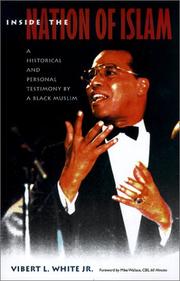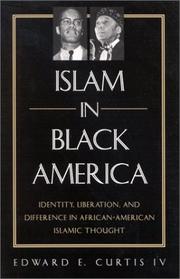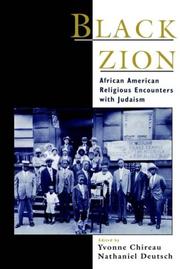| Listing 1 - 10 of 19 | << page >> |
Sort by
|
Book
ISBN: 9798890857392 1469653842 9781469653846 9781469653839 1469653834 9781469653815 1469653818 9781469653822 1469653826 Year: 2021 Publisher: Chapel Hill : The University of North Carolina Press,
Abstract | Keywords | Export | Availability | Bookmark
 Loading...
Loading...Choose an application
- Reference Manager
- EndNote
- RefWorks (Direct export to RefWorks)
In this bold political and intellectual history of the Nation of Islam, Garrett Felber centres the Nation in the Civil Rights Era and the making of the modern carceral state.

ISBN: 0813026547 9780813026541 9780813020822 0813020824 Year: 2001 Publisher: Gainesville, FL: University Press of Florida,
Abstract | Keywords | Export | Availability | Bookmark
 Loading...
Loading...Choose an application
- Reference Manager
- EndNote
- RefWorks (Direct export to RefWorks)
This detailed study of the internal workings of the Nation of Islam under the leadership of Louis Farrakhan examines the evolution of the organization since 1977 and its strange ideological menu of Black Nationalism, political-economic development, anti-Semitism, and conservative Republican ideals. Vibert White maintains that Farrakhan's Nation has become a cult that utilizes black nationalistic and religious dogma and its ability to create political and racial controversy to exploit poor and working-class black Americans for the leaders' economic and political gain. At the heart of Inside the Nation is White's chronicle of his own sojourn during the 1980s and 1990s as a registered Muslim--from his days as a foot soldier in the Fruit of Islam, the Nation's military organization, through his rise to the status of minister and advisor to the leadership. Included are White's dealings with such leaders as Louis Farrakhan, Akbar Muhammad, Khallid Muhammad, and Benjamin Chavis Muhammad and his involvement in such activities as the Million Man March. As one who traveled for the organization throughout Europe, Africa, the Middle East, and the United States, White was able to observe the leadership and the operation of the group at close hand. He reveals for the first time the detailed structure of NOI's business and religious operation. He explores and separates the Nation of Islam, the religious arm that is incorporated only in Chicago, from the Final Call, its business center operated only by the Farrakhan family. As a professional historian, White was able to separate the passion of the group's rhetoric from its real objectives, which centered on building a personal empire for Louis Farrakhan.
Black Muslims --- Bilalians --- Nation of Islam (Movement) --- African Americans --- Black nationalism --- Muslims --- History. --- Religion --- Farrakhan, Louis. --- פאראקן, לואיס --- Charmer --- Faraḳan, Luʼis --- Farrakhan, Abdul Haleem --- Muhammad, Louis Farrakhan --- Walcott, Louis Eugene --- Wolcott, Louis Eugene --- X, Louis --- Nation of Islam (Chicago, Ill.) --- American Muslim Mission --- World Community of al-Islam in the West --- NOI --- ONOI --- Original Nation of Islam --- Umat ha-Islam (Chicago, Ill.) --- אומת האיסלאם
Book
ISBN: 1469633949 1469633957 1469633922 1469633930 9798890840516 9781469633947 9781469633954 9781469633923 9781469633930 9798890840509 Year: 2017 Publisher: Chapel Hill : Baltimore, Md. : University of North Carolina Press, Project MUSE,
Abstract | Keywords | Export | Availability | Bookmark
 Loading...
Loading...Choose an application
- Reference Manager
- EndNote
- RefWorks (Direct export to RefWorks)
Black women's experience in the Nation of Islam has largely remained on the periphery of scholarship. Here, Ula Taylor documents their struggle to escape the devaluation of black womanhood while also clinging to the empowering promises of patriarchy.
Patriarchy. --- Muslim women --- African American women --- Black Muslims --- Social conditions --- History --- Social conditions. --- Nation of Islam (Chicago, Ill.) --- Bilalians --- Nation of Islam (Movement) --- African Americans --- Black nationalism --- Muslims --- Afro-American women --- Women, African American --- Women, Negro --- Women --- Islamic women --- Women, Muslim --- Androcracy --- Patriarchal families --- Fathers --- Families --- Male domination (Social structure) --- Patrilineal kinship --- Religion --- NOI --- ONOI --- Original Nation of Islam --- Umat ha-Islam (Chicago, Ill.) --- אומת האיסלאם --- American Muslim Mission --- World Community of al-Islam in the West --- Muslimahs

ISBN: 0791488594 0585471037 9780585471037 0791453693 9780791453698 0791453707 9780791453704 9780791488591 Year: 2002 Publisher: Albany : State University of New York Press,
Abstract | Keywords | Export | Availability | Bookmark
 Loading...
Loading...Choose an application
- Reference Manager
- EndNote
- RefWorks (Direct export to RefWorks)
Explores modern African-American Islamic thought within the context of Islamic history, giving special attention to questions of universality versus particularity.
African Americans --- Black Muslims --- African American Muslims --- Negritude --- Bilalians --- Nation of Islam (Movement) --- Black nationalism --- Muslims --- Afro-American Muslims --- Muslims, African American --- Race identity. --- Religion. --- History. --- Ethnic identity --- Religion --- Musulmans noirs américains --- Noirs américains --- Identité ethnique
Book
ISBN: 0814771246 9780814771242 9780814771372 0814771378 9780814769959 0814769950 9780814737866 0814737862 Year: 2014 Publisher: New York, NY : New York University Press,
Abstract | Keywords | Export | Availability | Bookmark
 Loading...
Loading...Choose an application
- Reference Manager
- EndNote
- RefWorks (Direct export to RefWorks)
Presents oral histories and interviews of women who belong to Nation of IslamWith vocal public figures such as Malcolm X, Elijah Muhammad, and Louis Farrakhan, the Nation of Islam often appears to be a male-centric religious movement, and over 60 years of scholarship have perpetuated that notion. Yet, women have been pivotal in the NOI's development, playing a major role in creating the public image that made it appealing and captivating.Women of the Nation draws on oral histories and interviews with approximately 100 women across several cities to provide an overview of women's historical contributions and their varied experiences of the NOI, including both its continuing community under Farrakhan and its offshoot into Sunni Islam under Imam W.D. Mohammed. The authors examine how women have interpreted and navigated the NOI's gender ideologies and practices, illuminating the experiences of African-American, Latina, and Native American women within the NOI and their changing roles within this patriarchal movement. The book argues that the Nation of Islam experience for women has been characterized by an expression of Islam sensitive to American cultural messages about race and gender, but also by gender and race ideals in the Islamic tradition. It offers the first exhaustive study of women’s experiences in both the NOI and the W.D. Mohammed community.
Book
ISBN: 1137540761 1137530847 Year: 2016 Publisher: New York : Palgrave Macmillan US : Imprint: Palgrave Macmillan,
Abstract | Keywords | Export | Availability | Bookmark
 Loading...
Loading...Choose an application
- Reference Manager
- EndNote
- RefWorks (Direct export to RefWorks)
This book examines the varied ways in which Minister Farrakhan’s Resurrected Nation of Islam appeals to men from different backgrounds. Dawn-Marie Gibson investigates a number of themes including faith, family, and community, making use of archival research and engaging in-depth interviews. The book considers the multifaceted ways in which men encounter the Nation of Islam (NOI) and navigate its ethics and gender norms. Gibson describes and dissects the factors that attract men to the NOI, while also considering the challenges that these men confront as new converts. She discusses the various inter-faith and community outreach efforts that men engage in and assesses their work with both their Christian and Muslim counterparts. To conclude its discussion, the book takes a look at the NOI’s 2015 Justice or Else March to commemorate the twentieth anniversary of the Million Man March in Washington, DC.
Gender identity-Religious aspect. --- Black Muslims. --- Farrakhan, Louis. --- Nation of Islam (Chicago, Ill.) --- Bilalians --- Black Muslims --- Nation of Islam (Movement) --- פאראקן, לואיס --- Charmer --- Faraḳan, Luʼis --- Farrakhan, Abdul Haleem --- Muhammad, Louis Farrakhan --- Walcott, Louis Eugene --- Wolcott, Louis Eugene --- X, Louis --- NOI --- ONOI --- Original Nation of Islam --- Umat ha-Islam (Chicago, Ill.) --- אומת האיסלאם --- African Americans --- Black nationalism --- Muslims --- Religion --- American Muslim Mission --- World Community of al-Islam in the West --- Islam-Doctrines. --- African Americans. --- Religion and sociology. --- Islamic Theology. --- African American Culture. --- Religion and Society. --- Religion and Gender. --- Religion and society --- Religious sociology --- Society and religion --- Sociology, Religious --- Sociology and religion --- Sociology of religion --- Sociology --- Afro-Americans --- Black Americans --- Colored people (United States) --- Negroes --- Africans --- Ethnology --- Blacks --- Islam—Doctrines. --- Gender identity—Religious aspects. --- Black people --- Farrakhan, Louis

ISBN: 1280453672 1423759656 0195354621 160256180X 9781423759652 9780195112573 0195112571 9780195112580 019511258X 9781602561809 9786610453672 6610453675 0197738389 Year: 2023 Publisher: New York : Oxford University Press,
Abstract | Keywords | Export | Availability | Bookmark
 Loading...
Loading...Choose an application
- Reference Manager
- EndNote
- RefWorks (Direct export to RefWorks)
This is an exploration of the interaction between African American religions and Jewish traditions, beliefs, and spaces. The collection's argument is that religion is the missing piece of the cultural jigsaw, and black-Jewish relations need the religious roots of their problem illuminated.
African Americans --- Black Hebrews. --- Black Muslims. --- Judaism --- Brotherhood Week --- Bilalians --- Black Muslims --- Nation of Islam (Movement) --- Black nationalism --- Muslims --- Black Israelites --- Black Jews (African American religious sects) --- Black Judaism --- Sects --- African American-Jewish relations --- Jewish-African American relations --- Jews --- Negro-Jewish relations --- Relations with Jews. --- Religion. --- Relations --- Christianity. --- Religion --- Relations with African Americans
Book
ISBN: 0271087099 0271088559 Year: 2020 Publisher: University Park, Pennsylvania : The Pennsylvania State University Press,
Abstract | Keywords | Export | Availability | Bookmark
 Loading...
Loading...Choose an application
- Reference Manager
- EndNote
- RefWorks (Direct export to RefWorks)
The Ansaru Allah Community, also known as the Nubian Islamic Hebrews (AAC/NIH) and later the Nuwaubians, is a deeply significant and controversial African American Muslim movement. Founded in Brooklyn in the 1960s, it spread through the prolific production and dissemination of literature and lecture tapes and became famous for continuously reinventing its belief system. In this book, Michael Muhammad Knight studies the development of AAC/NIH discourse over a period of thirty years, tracing a surprising consistency behind a facade of serial reinvention.It is popularly believed that the AAC/NIH community abandoned Islam for Black Israelite religion, UFO religion, and Egyptosophy. However, Knight sees coherence in AAC/NIH media, explaining how, in reality, the community taught that the Prophet Muhammad was a Hebrew who adhered to Israelite law; Muhammad’s heavenly ascension took place on a spaceship; and Abraham enlisted the help of a pharaonic regime to genetically engineer pigs as food for white people. Against narratives that treat the AAC/NIH community as a postmodernist deconstruction of religious categories, Knight demonstrates that AAC/NIH discourse is most productively framed within a broader African American metaphysical history in which boundaries between traditions remain quite permeable.Unexpected and engrossing, Metaphysical Africa brings to light points of intersection between communities and traditions often regarded as separate and distinct. In doing so, it helps move the field of religious studies beyond conventional categories of “orthodoxy” and “heterodoxy,” challenging assumptions that inform not only the study of this particular religious community but also the field at large.
Nuwaubian movement --- African Americans --- History. --- Religion. --- York, Dwight, --- Nubian Islamic Hebrews --- American Islam. --- Ansaaru Allah. --- Ansaru Allah. --- Black Islam. --- Black religion. --- Bushwick. --- Islam. --- Islamic hip hop. --- Malachi Z. York. --- Moorish Science. --- Nation of Islam. --- Nubian Islamic Hebrews. --- Nuwaubian. --- Nuwaubu. --- Nuwaupian. --- Nuwaupu. --- Rizq. --- Sudan. --- Sudanese diaspora – U.S. --- Supreme Mathematics. --- hip hop.
Book
ISBN: 1479846554 9781479846559 1479875007 Year: 2019 Publisher: New York : NYU Press,
Abstract | Keywords | Export | Availability | Bookmark
 Loading...
Loading...Choose an application
- Reference Manager
- EndNote
- RefWorks (Direct export to RefWorks)
Since the 1950s, and especially in the post-9/11 era, Muslim Americans have played outsized roles in US politics, sometimes as political dissidents and sometimes as political insiders. However, more than at any other moment in history, Muslim Americans now stand at the symbolic center of US politics and public life. This volume argues that the future of American democracy depends on whether Muslim Americans are able to exercise their political rights as citizens and whether they can find acceptance as social equals. Many believe that, over time, Muslim Americans will be accepted just as other religious minorities have been. Yet Curtis contends that this belief overlooks the real barrier to their full citizenship, which is political rather than cultural. The dominant form of American liberalism has prevented the political assimilation of American Muslims, even while leaders from Eisenhower to Obama have offered rhetorical support for their acceptance. Drawing on examples ranging from the political rhetoric of the Nation of Islam in the 1950s and 1960s to the symbolic use of fallen Muslim American service members in the 2016 election cycle, Curtis shows that the efforts of Muslim Americans to be regarded as full Americans have been going on for decades, yet never with full success. Curtis argues that policies, laws, and political rhetoric concerning Muslim Americans are quintessential American political questions. Debates about freedom of speech and religion, equal justice under law, and the war on terrorism have placed Muslim Americans at the center of public discourse. How Americans decide to view and make policy regarding Muslim Americans will play a large role in what kind of country the United States will become, and whether it will be a country that chooses freedom over fear and justice over prejudice.
Political culture --- Political participation --- Islam and politics --- Muslims --- Political activity --- United States. --- André Carson. --- Cold War. --- Gamal Abdel Nasser. --- Humayun Khan. --- Islam. --- Islamophobia. --- Jordan. --- Kareem Khan. --- Linda Sarsour. --- Malcolm X. --- Nation of Islam. --- activism. --- anticommunism. --- assimilation. --- capitalism. --- democracy. --- discrimination. --- dissent. --- election. --- foreign policy. --- hajj. --- immigration. --- liberalism. --- nationalism. --- politics. --- racial integration. --- racism. --- socialism. --- war on terror.
Book
ISBN: 9780271088556 0271088559 9780271087092 0271087099 Year: 2020 Publisher: University Park, Pennsylvania : The Pennsylvania State University Press,
Abstract | Keywords | Export | Availability | Bookmark
 Loading...
Loading...Choose an application
- Reference Manager
- EndNote
- RefWorks (Direct export to RefWorks)
The Ansaru Allah Community, also known as the Nubian Islamic Hebrews (AAC/NIH) and later the Nuwaubians, is a deeply significant and controversial African American Muslim movement. Founded in Brooklyn in the 1960s, it spread through the prolific production and dissemination of literature and lecture tapes and became famous for continuously reinventing its belief system. In this book, Michael Muhammad Knight studies the development of AAC/NIH discourse over a period of thirty years, tracing a surprising consistency behind a facade of serial reinvention.It is popularly believed that the AAC/NIH community abandoned Islam for Black Israelite religion, UFO religion, and Egyptosophy. However, Knight sees coherence in AAC/NIH media, explaining how, in reality, the community taught that the Prophet Muhammad was a Hebrew who adhered to Israelite law; Muhammad’s heavenly ascension took place on a spaceship; and Abraham enlisted the help of a pharaonic regime to genetically engineer pigs as food for white people. Against narratives that treat the AAC/NIH community as a postmodernist deconstruction of religious categories, Knight demonstrates that AAC/NIH discourse is most productively framed within a broader African American metaphysical history in which boundaries between traditions remain quite permeable.Unexpected and engrossing, Metaphysical Africa brings to light points of intersection between communities and traditions often regarded as separate and distinct. In doing so, it helps move the field of religious studies beyond conventional categories of “orthodoxy” and “heterodoxy,” challenging assumptions that inform not only the study of this particular religious community but also the field at large.
Nuwaubian movement --- African Americans --- History. --- Religion. --- York, Dwight, --- Nubian Islamic Hebrews --- American Islam. --- Ansaaru Allah. --- Ansaru Allah. --- Black Islam. --- Black religion. --- Bushwick. --- Islam. --- Islamic hip hop. --- Malachi Z. York. --- Moorish Science. --- Nation of Islam. --- Nubian Islamic Hebrews. --- Nuwaubian. --- Nuwaubu. --- Nuwaupian. --- Nuwaupu. --- Rizq. --- Sudan. --- Sudanese diaspora – U.S. --- Supreme Mathematics. --- hip hop.
| Listing 1 - 10 of 19 | << page >> |
Sort by
|

 Search
Search Feedback
Feedback About UniCat
About UniCat  Help
Help News
News